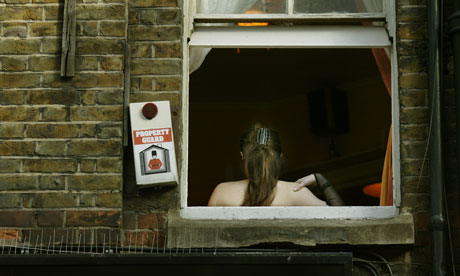
Today marks an interesting anniversary in Rhode Island. On 3 November 2009, Governor Donald Carcieri signed a bill criminalizing indoor prostitution and overturning a 29-year-old statute which allowed consenting adults to conduct sexual transactions for money behind closed doors. While some rural counties of Nevada allow brothels, Rhode Island laws were more liberal, with escorts working legally in homes, hotel rooms, and spas located in cities and towns across the Ocean State.
Rhode Island wasn't a lawless free-for-all, as some anti-prostitution advocates now contend. Pimping – sexual exploitation for the financial benefit of a third party – has always been a felony, and anti-trafficking laws were already in place to guard against forced prostitution.
Streetwalking, a public nuisance and a far riskier type of sex work, was considered a misdemeanor, and minors already had legal protection thanks to pre-existing laws pertaining to statutory rape, sexual assault and coercion. In reality, the passage of the 2009 anti-prostitution law only affected adult sex workers who were either self-employed or working in spas of their own free will.
So what was the problem?
Most people thought there wasn't one. Anti-prostitution bills had been introduced in the state legislature every year since 2005, unceremoniously fizzling out each time. In 2009, a local television reporter Bill Rappleye canceled a report on the anti-prostitution bill – intended to include comments from irate viewers who visited his blog – after it became clear that most people were ambivalent about the legislation. Rappleye later blogged wistfully that it "doesn't seem like a lot of [viewers] are worried about the exploitation of women here".
His equation of prostitution with exploitation of women is a common one, though my own experience as a gay male sex worker runs counter to that misconception. I escorted briefly after college, and several friends – some in graduate school, some with careers – also turned to prostitution for extra cash. None of us felt exploited; we were self-employed men and women, working where and when we wanted. We advertised online and charged what we considered reasonable rates.
Rhode Island traditionally has among the highest unemployment rates in the nation, and escorting provided a convenient way for us to manage hefty student loan bills. In one hour with a client I made as much money as I made in a whole week at my part-time retail job; I may have felt financially exploited, but for reasons completely unrelated to sex work.
The crusade for criminalization was spearheaded by Donna M Hughes, a socially conservative women's studies professor who founded the organization Citizens Against Trafficking specifically to gather support around this legislation. She and Melanie Shapiro, one of her undergraduate students, led the frenzied charge with a series of emotional but factually challenged newsletters (for example, blaming "spa-brothels" – their own term – for gang stabbings at local nightclubs). Their "organization" seems to have dissolved (or at least stopped doing much) at some point in 2011, making it clear that trafficking was never their real concern.
Former Representative Joanne Giannini, who sponsored all five anti-prostitution bills, recently wrote an editorial praising her own legislation with respect to a lurid case involving a Boston man who allegedly kidnapped two Massachusetts teenagers and held them captive in Providence; he is also accused of sexually assaulting one of them. It's sad that someone can equate the behavior of consenting adults with allegations of kidnapping and statutory rape.
I testified in opposition to the anti-prostitution bill, presenting myself as a concerned citizen, which I was, and not as a retired sex worker. Hughes, Shapiro, and state police officers favored criminalization; those opposed were a more motley crew, including everyone from professional sex educator Megan Andelloux to Lightning Bolt drummer Brian Chippendale. It probably looked like the "good guys" versus the lewd ones, but that's not a fair characterization. We tried to show how this bill would make things more dangerous. And that's exactly what has happened.
Bella Robinson, an escort affiliated with sex workers rights group COYOTE, moved to Rhode Island specifically for the legal protection here. "I've never been more terrified than when I had that SWAT team bust through my door," she says in reference to an earlier arrest at a New Jersey home.
Within four hours I pled guilty. The judge told me that I'd go to jail unless I paid $310 a month for a year. In other words he was essentially telling me to go out and turn some more tricks to pay the court.
Indoor prostitution hasn't gone anywhere. A spa – easily found on several adult review sites – currently operates near the Providence Journal building on a busy thoroughfare in downtown Providence. And a quick search of popular escort sites reveals both male and female escorts working in the Ocean State, as they do in every other state where prostitution is illegal.
The main difference now is that they have no protection. One case from early 2009 illustrates why I think criminalization was such a bad idea. A young attorney from North Providence was moonlighting as an escort, and one evening she was attacked at knifepoint by an unstable client. Knowing that she had the protection of the law, this woman – whose name I don't use to respect her own wishes – called the police and the man was swiftly apprehended. Had this incident happened a few months later, she might have never made that call and her appalling attacker might never have been caught.
"Escorts from across the country call me for advice", Robinson says. "And I only have one thing to really tell them: do not call the cops. No matter what."

